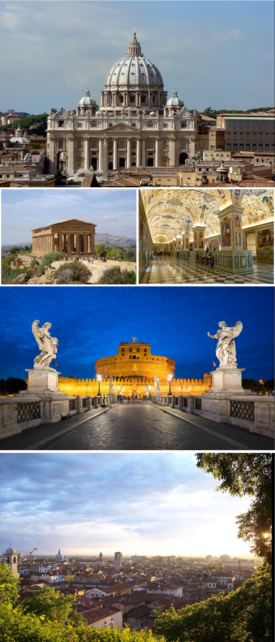Deopolis
Deopolis | |
|---|---|
 From top, left to right: St. Murphy's Cathedral, ancient Friulian temple on the outskirts of the city, the Leotine Hall in Leotine Chapel, Castuhinga dox Anmua, and a view of the city from Milvian Heights | |
| Etymology: Aroman for "City of God" | |
| Nickname(s): Ziogolora (Friulian, historical) Capital Caput dox Salveae (Salvian) | |
| Motto(s): Atua dox Amare, Atua dox Iustito "God of Love, God of Justice" | |
| Country | |
| Region | Ziogolora |
| Province | Deopolis |
| Communes | Aslanai Copiatoli Gaumonte Marcati |
| Founded | 6th century BC |
| Administrative division | 4 communes |
| Government | |
| • Mayor | Petior Hialgo (TP) |
| Area | |
| • Capital city | 105.4 km2 (40.7 sq mi) |
| Population (1 January 2020 (est)) | |
| • Capital city | 2,232,198 |
| • Density | 21,000/km2 (55,000/sq mi) |
| • Metro | 4,535,901 |
| Demonym | Deopolisian(s) |
| Time zone | UTC+3 (Central Adlantic Time) |
| Salvian Postal Code (SPC) | 00001–00020, 00023 |
Deopolis, known in Salvian as Deopolia, is the capital of Salvia, as well as the regional capital of the Ziogolora region. With a population of 2,232,198, it is the most populated city in Salvia and the third largest in Marenesia. The city is also the center of the Deopolis Metropolitan Area, which has a population of 4,535,901, making it the most populous metropolitan city in Salvia. It sits on the eastern seaboard of Salvia and borders the Ascloni region to the north and the Lavazza region to the south.
Founded under the name of Ziogolana sometime in the 6th century BC, the city grew in size and prominence during the First Salvian Imperium and became the imperial capital before falling into ruin amidst constant sackings during political turmoil in the 7th century AD. The area remained largely uninhabited until its reconstruction by King Joseph I, who upon coronation declared it the capital. The city was swiftly repopulated and acted as the capital of the Holy Salvian Catholic Empire for most of its 6 century history, becoming the cultural, political, and economic center of the country.
